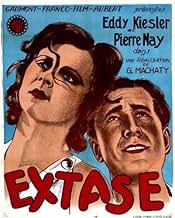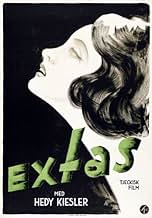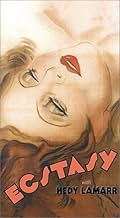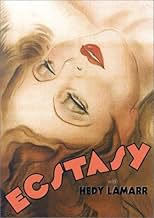Eva acaba de casarse con un señor mayor. Ella lo deja y un día, conoce a un joven y se enamoran. El destino une al marido con el joven amante que le ha arrebatado a Eva.Eva acaba de casarse con un señor mayor. Ella lo deja y un día, conoce a un joven y se enamoran. El destino une al marido con el joven amante que le ha arrebatado a Eva.Eva acaba de casarse con un señor mayor. Ella lo deja y un día, conoce a un joven y se enamoran. El destino une al marido con el joven amante que le ha arrebatado a Eva.
- Dirección
- Guionistas
- Elenco
- Premios
- 2 premios ganados y 1 nominación en total
Hedy Lamarr
- Eva Hermann
- (as Hedy Kiesler)
Antonín Kubový
- Landarbeiter
- (as Antonin Kibový)
Ladislav Bohác
- Adam
- (sin créditos)
Comedian Harmonists
- Themselves
- (sin créditos)
Kani Kipçak
- Dr. Brady
- (sin créditos)
Karel Macha-Kuca
- Der Rechtsanwalt
- (sin créditos)
Jirina Steimarová
- Typist
- (sin créditos)
Opiniones destacadas
(No need to recap the plot, since others have done so already.)
It's understandable that many viewers find fault with the film, raised as we are with the slam-bang sensurround of today's cineplex experience. Against that background, a movie like Ecstasy appears to have wandered in from another planet. I think there are several worthwhile reasons why.
Most importantly, the film unfolds poetically, as the camera pans slowly over surrounding hills, trees, clouds, etc., providing a serene and lyrical sense of a natural world that integrates the man and woman into its fold. Together these reveal a style and dimension almost totally missing from today's technology-driven cinema, where rapid-fire editing works to divert audience attention and not to concentrate it. Additionally, the story is conveyed by eye and not by ear, with almost no dialogue to explain what's happening. This amounts to another extreme departure from today's very literal fare, where visuals only seem to count when they excite the audience. But perhaps most unsettling-- the movie is sometimes eerily quiet, not in the sense that silent films are quiet since we expect them to be. But in the sense that the characters seldom speak when we expect them to. Thus, the burden of the story is shared between the film-maker and the viewer. The former must choose his visuals artfully so as to convey the narrative, while the latter must think about those visuals, since they're not going to be explained.
None of this is intended to belittle today's film-making. It's simply to point out that a movie like Machaty's comes out of a very different aesthetic from the one we have today. I don't claim either to be any better or worse. However, I do claim that Ecstasy represents a perspective sorely missing from today's movie-going experience, where such 'contemplative values are routinely dismissed as slow and boring.
The film itself is no masterpiece, though at times it reaches artistic heights, as in the beautifully composed beer-garden scene with its final crane shot rising to reveal the exquisite tableau below. The slow pans of the countryside with its pantheistic celebration of life, nature, and regeneration are also wonderfully expressed. These are the kind of scenes that don't overwhelm you, but instead-- given half-a chance-- accumulate quietly into an experience as memorable in its own way as the spine-tingling variety of a "Jaws".
On the other hand, the film is sometimes heavy-handed, as when Machaty piles on the imagery, particularly in the final, ode-to-labor sequence. It's hard to know what to make of this rather disruptive presence. Perhaps the symbolism has to do with the heroic dimension that hard work holds for the love-lorn hero and people in general-- a theme then being promoted by the influential Soviet cinema. Still, its presence here is rather tediously over-done.
Anyhow, I've got to admit that I tuned in initially to see the gorgeous Hedy LaMarr in the buff. But now I have to admit that in the process I also got a lot more than just a peek-a-boo romp in the woods.
It's understandable that many viewers find fault with the film, raised as we are with the slam-bang sensurround of today's cineplex experience. Against that background, a movie like Ecstasy appears to have wandered in from another planet. I think there are several worthwhile reasons why.
Most importantly, the film unfolds poetically, as the camera pans slowly over surrounding hills, trees, clouds, etc., providing a serene and lyrical sense of a natural world that integrates the man and woman into its fold. Together these reveal a style and dimension almost totally missing from today's technology-driven cinema, where rapid-fire editing works to divert audience attention and not to concentrate it. Additionally, the story is conveyed by eye and not by ear, with almost no dialogue to explain what's happening. This amounts to another extreme departure from today's very literal fare, where visuals only seem to count when they excite the audience. But perhaps most unsettling-- the movie is sometimes eerily quiet, not in the sense that silent films are quiet since we expect them to be. But in the sense that the characters seldom speak when we expect them to. Thus, the burden of the story is shared between the film-maker and the viewer. The former must choose his visuals artfully so as to convey the narrative, while the latter must think about those visuals, since they're not going to be explained.
None of this is intended to belittle today's film-making. It's simply to point out that a movie like Machaty's comes out of a very different aesthetic from the one we have today. I don't claim either to be any better or worse. However, I do claim that Ecstasy represents a perspective sorely missing from today's movie-going experience, where such 'contemplative values are routinely dismissed as slow and boring.
The film itself is no masterpiece, though at times it reaches artistic heights, as in the beautifully composed beer-garden scene with its final crane shot rising to reveal the exquisite tableau below. The slow pans of the countryside with its pantheistic celebration of life, nature, and regeneration are also wonderfully expressed. These are the kind of scenes that don't overwhelm you, but instead-- given half-a chance-- accumulate quietly into an experience as memorable in its own way as the spine-tingling variety of a "Jaws".
On the other hand, the film is sometimes heavy-handed, as when Machaty piles on the imagery, particularly in the final, ode-to-labor sequence. It's hard to know what to make of this rather disruptive presence. Perhaps the symbolism has to do with the heroic dimension that hard work holds for the love-lorn hero and people in general-- a theme then being promoted by the influential Soviet cinema. Still, its presence here is rather tediously over-done.
Anyhow, I've got to admit that I tuned in initially to see the gorgeous Hedy LaMarr in the buff. But now I have to admit that in the process I also got a lot more than just a peek-a-boo romp in the woods.
This was a very daring film for it's day. It could even be described as soft-core porn for the silent era. It was a talkie, but dialog was extremely limited, and in German. One did not need it anyway.
The young (19) Hedy Lamarr gets trapped in a loveless marriage to an obsessive (stereotype?) German and after a short time in a marriage that was apparently never consummated, returns home to her father.
In a famous and funny scene, she decides to go skinny dipping one morning when her horse is distracted by another. She is then forced to run across a field chasing after it, as she left her clothing on the horse. An engineer retrieves her horse and returns her clothing - after getting an eyeful.
They sit for a while and, in a zen moment, he presents her with a flower with a bee sitting on top. This is where she thinks back to her honeymoon and the actions of her husband and an insect. She knows this man is different.
She returns home and eventually seeks out our young fellow, and finds the ecstasy she was denied. You can use your imagine here, but his head disappears from view and we see her writhing with pleasure. Since he never got undressed, you can imagine... Certainly, an homage to women by the director Gustav Machatý, and a shock to 1933 audiences.
The only thing that mars this beautifully filmed movie is the excessive guilt, and a strange ending.
The young (19) Hedy Lamarr gets trapped in a loveless marriage to an obsessive (stereotype?) German and after a short time in a marriage that was apparently never consummated, returns home to her father.
In a famous and funny scene, she decides to go skinny dipping one morning when her horse is distracted by another. She is then forced to run across a field chasing after it, as she left her clothing on the horse. An engineer retrieves her horse and returns her clothing - after getting an eyeful.
They sit for a while and, in a zen moment, he presents her with a flower with a bee sitting on top. This is where she thinks back to her honeymoon and the actions of her husband and an insect. She knows this man is different.
She returns home and eventually seeks out our young fellow, and finds the ecstasy she was denied. You can use your imagine here, but his head disappears from view and we see her writhing with pleasure. Since he never got undressed, you can imagine... Certainly, an homage to women by the director Gustav Machatý, and a shock to 1933 audiences.
The only thing that mars this beautifully filmed movie is the excessive guilt, and a strange ending.
There's no entertainment value in this confusing montage fest. There's a love triangle melodrama wrapped inside, but it's not worth the price of admission. I suspect the film is dripping with all sorts of symbolism, but what it says is never entirely clear. We get shots of flowers, horses, pick axes, and flies, flies, flies. The artsy montages interrupt the story whenever possible and go on and on, overstaying their welcome after delivering their messages.
This practically silent Czech-made movie is notable today for its nude and erotic scenes with Hedy Lamarr, years before she became a star in Hollywood. The scenes, tastefully done, really pushed the envelope back in the early 1930s, giving this film some historical significance.
It boggles my mind to see so many rave reviews for this film. Sure, it has its claims to cinematic history, but this is not a very good film. It is way too drawn out, weighed down by heavy-handed symbolism, and ultimately unsatisfying. A footnote in a textbook, sure, but no masterpiece.
Perhaps one must possess a certain artistic mind to fully appreciate this film's "poetry". If that is the case, I guess I just don't have it.
Not worth your time except as a curiosity for the rabid cinephile.
This practically silent Czech-made movie is notable today for its nude and erotic scenes with Hedy Lamarr, years before she became a star in Hollywood. The scenes, tastefully done, really pushed the envelope back in the early 1930s, giving this film some historical significance.
It boggles my mind to see so many rave reviews for this film. Sure, it has its claims to cinematic history, but this is not a very good film. It is way too drawn out, weighed down by heavy-handed symbolism, and ultimately unsatisfying. A footnote in a textbook, sure, but no masterpiece.
Perhaps one must possess a certain artistic mind to fully appreciate this film's "poetry". If that is the case, I guess I just don't have it.
Not worth your time except as a curiosity for the rabid cinephile.
This early German talkie stars the gorgeous Hedy Lamarr as a bored hausfrau and is notorious for not only showing her in her birthday suit but also in the throes of passion. The film was banned in the US! For that reason alone, one should watch it. Lamarr is truly beautiful and offers a strong performance as the woman who falls for the security of an older man (and marries him) only to become restless and subsequently enthralled with a younger, more exciting lover.
10wndlz
This film could have been a silent movie; it certainly has the feel of one. I was extremely, extremely lucky to see this very rare version of this film. Extase, is a 'symphony of love', and transcends all language versions. French, which is the ultimate romantic language, seems quite suitable for this very sensual and lyrical version.A young Hedy Lamarr lights up the screen, in this film which, in a way is almost like a sex fantasy; but definitely far from being pornographic.Tech qualities may have been a little crude; but that does not detract from the magical spell this film exudes.Many lovers of early cinema, would absolutely adore this film.
¿Sabías que…?
- TriviaFirst surviving non-pornographic film to depict a woman having an orgasm.
- ErroresIn the beginning when Emil is in the bedroom, a closeup of the photo on the bedside table is shown to have writing on it. On the second closeup, when Emil is carefully rearranging his keys and other items, there is no writing.
- Citas
Eva Hermann: Tell him... no. Don't tell him anything.
- Versiones alternativasTo get the film around the more conservative German censors, an alternate version of Hedy Lamarr's nude bathing scenes was shot in which she was partially obscured by strategically-placed bushes.
- ConexionesEdited into Histoire(s) du cinéma: Fatale beauté (1994)
Selecciones populares
Inicia sesión para calificar y agrega a la lista de videos para obtener recomendaciones personalizadas
- How long is Ecstasy?Con tecnología de Alexa
Detalles
- Tiempo de ejecución
- 1h 22min(82 min)
- Color
- Mezcla de sonido
- Relación de aspecto
- 1.19 : 1
Contribuir a esta página
Sugiere una edición o agrega el contenido que falta































